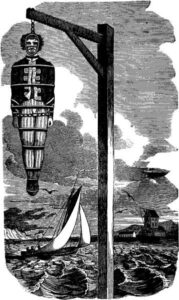In the United States, capital punishment is reserved primarily for murderers, but some other nations consider a larger number of crimes warrant the death penalty. These crimes include acts that harm another person such as rape and aggravated assault, or political offenses, such as espionage and treason. Military factions often have their own list of crimes that are deemed worthy of capital punishment. These include displays of cowardice during a battle, desertion, insubordination to a higher ranking officer, and any attempt at mutiny. Centuries ago, the list of offenses punishable by execution was far more expansive.
Ancient civilizations viewed the death penalty as the ultimate method of deterrence. Executions were often large public events where people would gather to taunt the prisoners and cheer their demise. The officials of the time wanted the general public to see exactly what could happen to them if they committed the same types of crimes. Lists of punishable offenses were more extensive, and there were many more reasons a person could be put to death. Ancient Greek and Roman cultures considered a tremendous number of deeds worthy of capital punishment, and as recently as the 19th century, some nations designated more than two hundred crimes as deserving of capital punishment.
The bodies of those put to death were often displayed for public viewing. This allowed for increased awareness of the public execution. One notorious example of this was established in Afghanistan, when law breakers were placed in small cages hung high off the ground. The prisoners would be locked inside and left to die slowly. This allowed for anyone passing by to see both the prisoner while they were being tormented, and the aftermath. Although an incredibly brutal policy, it was extremely effective in greatly reducing the amount of robberies and related crimes in the country.
These days, many nations are moving away from the concept of capital punishment. The practice has been abolished entirely in locations all around the world. Many modern societies have become more concerned with the rights of the accused and the possibility of wrongful execution for innocent people. Other forms of deterrence, such as long term imprisonment, have become more widely accepted. Several countries do still actively execute criminals, but it is usually reserved for people who have committed serious offenses such as sexual assault, war crimes, and murder.

